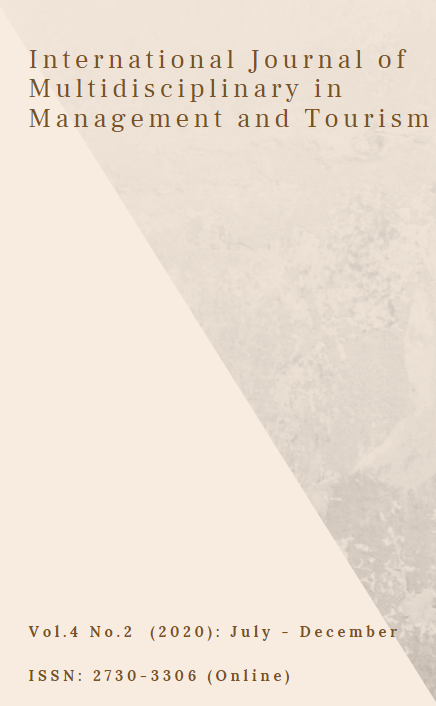The Application of Stimulus-Organism-Response (SOR) Theory for Studying Workforce Contributions in the Pineapple Factories in Chiang Rai
Main Article Content
Abstract
In this study the SOR (Stimulus Organism Response) theory that is typically used in consumer behaviors is employed for workforce contribution study of organizational performance, which exploits the theories of job demand-resources (JD-R), motivation and trust as stimuli. The conceptualized model was empirically tested using the phu-lae and nang-lae pineapple manufacturers and traders in the Thasud, Ban Du and Nang Lae districts of Chiang Rai. The surveys were conducted in September-October 2019, which is the low-production season. The structural equation modeling (SEM) analysis shows perfect fits, evidenced with Normed Fit Index (NFI), Comparative Fit Index (CFI), Tucker Lewis Index all closer to 1.0, and RMSEA at 0.051, and the livelihood minimization shows absolute model fit, at p = 0.282, which is p > 0.05, at /2 = 1.251, much below the threshold number, 5.
Article Details

This work is licensed under a Creative Commons Attribution-NonCommercial-NoDerivatives 4.0 International License.
References
Ajzen, I. (1991). The Theory of Planned Behavior. Organizational behavior and human decision processes, 50(2), 179-211.
Bakker, A.B. and Demerouti, E. (2014). Job Demands-Resources Theory: Work and Wellbeing A Complete Reference Guide. New York: John Wiley & Sons.
Brown, S.P., William L. C. & Slocum, J.W. (1998). Effects of Trait Competitiveness and Perceived Intraorganizational Competition on Salesperson Goal Setting and Performance. Journal of Marketing, 62(4), 88-98.
Carlson, D. S. & Pamela L. P. (1999). The Role of Social Support in the Stressor-Strain Relationship: An Examination of Work-Family Conflict. Journal of management , 25(4), 513-540.
Chen, C.T., King, B. (2018). Shaping the Organizational Citizenship Behavior or Workplace Deviance: Key Determining Factors in the Hospitality Workforce. Journal of Hospitality and Tourism Management, 35, 1-8.
Hair, F. Jr, Marko S. J., Hopkins, L. & Kuppelwieser, V.G. (2014). Partial Least Squares Structural Equation Modeling (Pls-Sem) an Emerging Tool in Business Research. European Business Review, 26(2), 106-121.
Hasachoo, N. & Kalaya, P. (2013). Competitiveness of Local Agriculture: the Case of Longan Fruit Trade between China and the North of Thailand. Bangkok: The Research Institute on Contemporary Southeast Asia (IRASEC).
Kalkavan, S., Katrinli, A. (2014). The Effects of Managerial Coaching Behaviors on the Employees’ Perception of Job Satisfaction, Organizational Commitment, and Job Performance: Case Study on Insurance Industry in Turkey. Procedia-Social and Behavioral Sciences, 150, 1137-1147.
Karatepe, O. M. & Olugbade, O.A. (2009). The Effects of Job and Personal Resources on Hotel Employees’ Work Engagement. International Journal of Hospitality Management 28(4), 504-512.
Kim, W.G. & Brymer, R.A. (2011). The Effects of Ethical Leadership on Manager Job Satisfaction, Commitment, Behavioral Outcomes, and Firm Performance. International Journal of Hospitality Management, 30(4), 1020-1026.
Locke, E.A. (1976). The Nature and Causes of Job Satisfaction. Handbook of Industrial and Organizational Psychology,1, 1297-1343.
National Economic and Social Development Board of Thailand. (2015). GDP Growth Rate. Retrieved from http://www.nesdb.go.th.
Organ, D.W. (1988). Organizational Citizenship Behavior: The Good Soldier Syndrome.” Lexington Books/DC Heath and Com
Organ, D.W. (1988) Organizational Citizenship Behavior: The Good Soldier Syndrome. London: Lexington Books.
Ryan, R.M. & Deci, E.L. (2000). Intrinsic and Extrinsic Motivations: Classic Definitions and New Directions. Contemporary educational Psychology, 25(1), 54-67.
Srirattanaprasit , S. & Tan, C. C.. (2015). An Examination of Job Resources and Demands as Antecedent Of Employee Satisfaction, Loyalty and Job Performance for the Construction Businesses in Chiang Rai, Thailand. Paper presented to the International Multidisciplinary Academic Conference organized by UNESCO for its 70th Anniversary Celebrations, United Nations Educational, Scientific and Cultural Organization, November 2-3, Thailand.
Srirattanaprasit , S. & Tan, C. C.. (2015). Role of Hygienic-Motivational Job Resources and Demands in Inducing Job Satisfaction, and Subsequent Organizational Commitment and In-Role and Extra-Role Organizational Citizenship Behavior: A Case Study with Construction Material Business in Chiang Rai, Thailand. Paper presented to the International Multidisciplinary Academic Conference organized by UNESCO for its 70th Anniversary Celebrations, United Nations Educational, Scientific and Cultural Organization, November 2-3, Thailand.
Sutichaiya, J. (2018). Annual Report of Office of Agricultural Economics. Bangkok: Office of Agricultural economics.
Tan, C. C. (2017). A Field Trip Approach to Studying the role of Tour Guides in Shaping the Tourist Experience. Journal of Mekong Societies, 13(2), 23-44.
Tan, C. C. (2016). Towards a Phenomenological Theory of Corporate Social Responsibility and Its Spirited Services. Ibrahimpatnam, Krishna Dt, AP. India: IMRF Publication House.
Thu, S.L., Tam, H., Tongdeesoontorn, W, & Suthiluk, P. (2017). Quality Changes and Volatile Compounds in Fresh-Cut ‘Phulae’Pineapple During Cold Storage. Current Applied Science and Technology, 17(2), 162-171.

